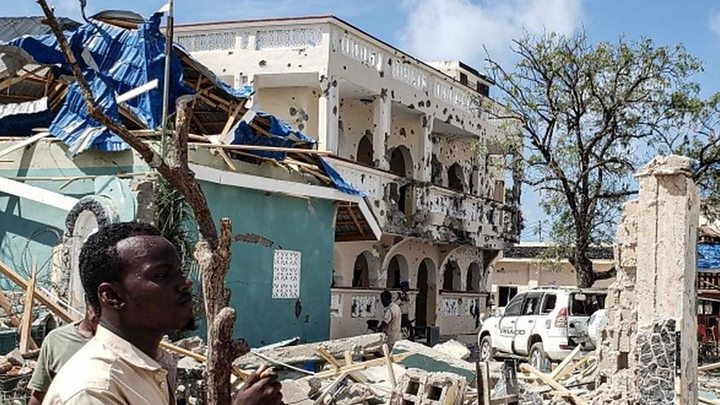While most coverage of Somalia focused on civil war, militancy and famine, Hodan Nalayeh made it her mission to show another side to the country – its beauty and that of its people.
Her desire to focus on the positive and ultimately inspire young Somalis around the world to help rebuild the country made her famous – and her death in Friday’s attack on a hotel in the southern city of Kismayo has prompted an outpouring of grief.
She and her husband Farid Juma Suleiman were among the 26 people killed as gunmen stormed the Asasey Hotel, where regional politicians and clan elders were discussing a forthcoming regional election.
In a Facebook post, her family said Nalayeh – a 43-year-old mother-of-two who was pregnant at the time of her death – had “spent her life devoted to serving the Somali people and reporting on positive, uplifting stories” in order to “spread light and love to the Somali world”.
“She brought inspiration and hope to the Somali people through storytelling. She will be deeply missed,” the statement said.

Nalayeh was born in the northern Somali city of Las Anod but grew up in Canada after moving there with her parents and 11 siblings when she was six. She decided to base herself in Somalia last year.
While in Canada her father, a former diplomat, worked as a parking attendant, according to an interview she gave to Toronto.com.
In her 30s, Nalayeh studied for a postgraduate degree in broadcast journalism and in 2014 she launched Integration TV, an online platform aimed at the Somali community in Canada and the wider Somali diaspora.
She told the podcast Meaningful Work, Meaningful Life that social media had “changed the game for how people learn about culture”.
“If we don’t become the creators of our own content, we are going to be at the mercy of other people telling the stories of Africa,” she said, according to CBC.

Canada’s Immigration Minister Ahmed Hussen – himself of Somali origin – said Nalayeh had highlighted the Somali community’s contributions in Canada.
“She became a voice for many. We mourn her loss deeply, and all others killed in the Kismayo attack,” he said.
Integration TV quickly became popular among the Somali diaspora and also brought her into contact with her husband, who was reportedly helping to build wells in Somalia. They married in the Kenyan capital Nairobi last November, AP reported.
In 2018 Nalayeh moved to Somalia where she continued her reporting. Recent episodes had focused on Somalia’s female entrepreneurs and things to do in the city of Las Anod and she also used her social media accounts to highlight local life and culture.![]()
Many of the tributes paid to her on social media have described her as “inspirational” and an initial report of her death by a local radio station, Dalsan FM, was retweeted more than 2,000 times.
BBC Somali’s Farhan Jimale, a friend of Nalayeh’s, described her as a “bright star and a beautiful soul who represented the best of her people and homeland”.
“She always looked for the beauty in things, whether the people or the landscape, and wanted to tell a different Somalia, not the one we see on the media,” he said.

Nalayeh had hoped that her work would encourage young Somalis abroad to move to the country and help make a difference, Jimale said.
“She was especially an inspiration for the young. You have Somalis from diaspora going home and she was a link between older Somalis and the young. She spoke both languages – English and Somali – so she was like a bridge.”
In a recent interview, she had been asked what she hoped her legacy would be. “She said she didn’t want money or fame, she just wanted to unite Somalis,” Jimale said.
Her death at the hands of militants would only amplify her message, he said.
“The grief shown by all Somalis shows that she was doing the right thing and that people are still defiant. No, we are not giving up,” Jimale said.
“Most Somalis will say lets continue her legacy and fight for change.”





